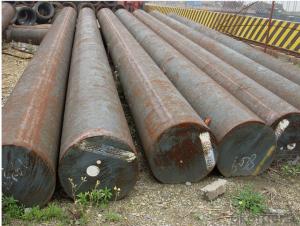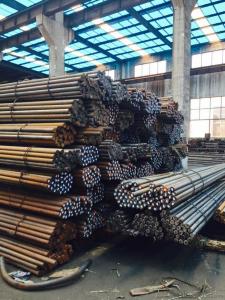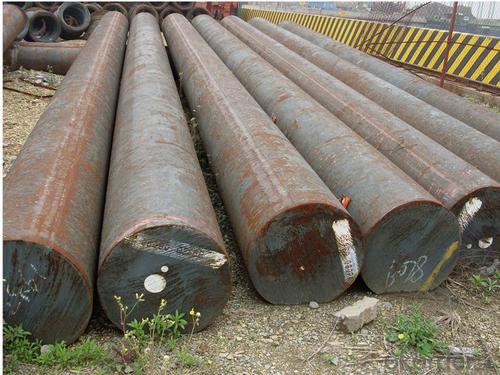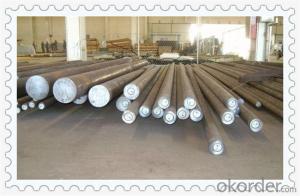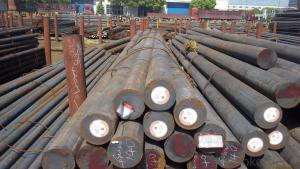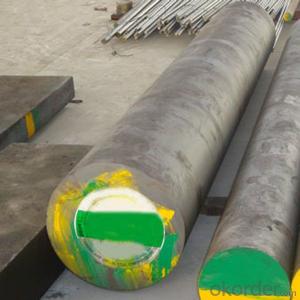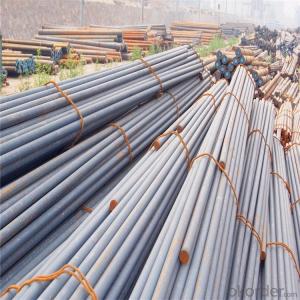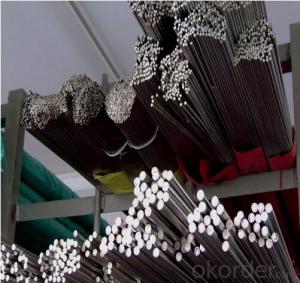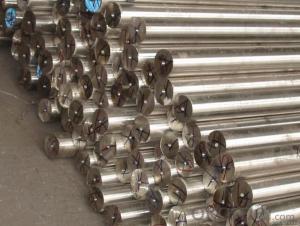Special Steel 1.2631 Round Steel / A8 Tool Steel Round Bar
- Loading Port:
- China main port
- Payment Terms:
- TT or LC
- Min Order Qty:
- 25 m.t.
- Supply Capability:
- 10000 m.t./month
OKorder Service Pledge
OKorder Financial Service
You Might Also Like
Specification
The details of our Steel
1. Produce Standard: as the GB, AISI, ASTM, SAE, EN, BS, DIN, JIS Industry Standard
2. Produce processes: Smelt Iron -EAF smelt Billet - ESR smelt Billet -Hot rolled or forged get the steel round bar and plate
3. Heat treatment:
Normalized / Annealed / Quenched+Tempered
4. Quality assurance:
All order we can received Third party inspection, You can let SGS, BV,.. and others test company test and inspect our products before Goods shipping.
Product information
Chemical Composition(%) of A8 steel round bar | C | Si | Mn | S | P | Cr | Mo | V |
0.90-1.05 | 0.20-0.40 | 0.40-0.70 | ≤0.035 | ≤0.035 | 4.80-5.50 | 0.90-1.20 | 0.10-0.30 | |
Specification of A8 steel round bar | Dia.*L=14~50mm*2000~5000mm | |||||||
Characteristic of A8 steel round bar | 1.good machinability and abrasivity 2.good hardness | |||||||
Application of A8 A8 steel round bar | 1.Precision Stamping Dies 2.Precison Blanking Dies of wire cutting process, and stamping dies for various uses 3.Tools for plactic deformation of hard processing material 4.Dies for forging, deep drawing and thread rolling 5.High speed blanking punch,stainless plates punch 6.Tensile modulus, crimping die, embossing dies, wear plastic molding mold | |||||||
Heart Treatment of A8 steel round bar | 1.Quench: 940-960°c oil cooling 2.Tempering temperature: 210~240 °C 3. Hardness: 61HRC | |||||||
Melting Process of A8 steel round bar | 1. EAF: Electric Furnace+LF+VD(Optional) 2. ESR: Electric Furnace+LF+VD+Eleroslag Remelted(Optional) | |||||||
Payment Term of A8 steel round bar | L/C or T/T, 30% in advance, 70% before the shipment | |||||||
Main product
Plastic Mould Steel
DIN 1.2311,1.2738,1.2083,1.2316 etc.
AISI P20,P20+Ni,420 etc.
JIS SUS420J2
Hot Work Steel
DIN 1.2344,1.2343,1.2367,1.2365,1.2581,1.2713 etc.
AISI H13,H11,H10,H21, etc.
JIS SKD61,SKD6,SKD5,SKT4 etc.
Cold Work Steel
DIN 1.2739, 1.2601, 1.2080, 1.2436, 1.2631, 1.263, 1.2510, 1.2327 etc.
AISI D2, D5, D3, D6, A8, A2, O1 etc.
JIS SKD10, SKD11, SKD1, SKS3 etc.
High Speed Steel
DIN 1.3343, 1.3243, 1.3247, 1.3355 etc.
AISI M2, M35, M42, T1 etc.
JIS SKH51, SKH35, SKH59, SKH2 etc.
Alloy Structural Steel
DIN 1.7035,1.6511,1.7220,1.7225 etc.
AISI 5140, 4340, 4135, 4140 etc.
JIS SCr440,SNCM439,SCM435,SCM440 etc.
Stainless & Carbon Steel or Others
DIN 1.4125,1.1191 etc
AISI 440C,1045, 1020 etc.
JIS SUS440C,S45C etc
Product show

Workshop show

Shipping
1. FedEx/DHL/UPS/TNT for samples, Door-to-Door;
2. By Air or by Sea for batch goods, for FCL; Airport/ Port receiving;
3. Customers specifying freight forwarders or negotiable shipping methods!
Delivery Time: 3-7 days for samples; 5-25 days for batch goods.
Payment Terms
1.Payment: T/T, L/C, Western Union, MoneyGram,PayPal; 30% deposits; 70% balance before delivery.
2.MOQ: 1pcs
3.Warranty : 3 years
4.Package Informations: 1) EXPORT, In 20 feet (GW 25 ton) or 40 feet Container (GW 25 ton)
2)as customer's requirement
Why choose us?
(1) The leading exporter in China special steel industry.
(2) Large stocks for various sizes, fast delivery date.
(3) Good business relationship with China famous factories.
(4) More than 7 years steel exporting experience.
(5) Good after-sales service guarantee.
- Q: What are the common challenges in machining titanium alloys?
- The common challenges in machining titanium alloys include their high chemical reactivity, low thermal conductivity, high cutting forces, and poor chip control. Additionally, titanium alloys tend to work harden, making them prone to tool wear and requiring frequent tool changes. Moreover, their low modulus of elasticity can lead to vibration and chatter during machining operations, affecting surface quality and dimensional accuracy.
- Q: What are the specific requirements for special steel used in the defense armor industry?
- The defense armor industry requires special steel to meet specific requirements: 1. Exceptional strength is necessary for defense armor to withstand the impact of projectiles and explosives and resist deformation and penetration under extreme conditions. 2. High hardness is essential to provide resistance against cutting, drilling, or other forms of mechanical damage, ensuring the armor can withstand attacks and prevent penetration. 3. Toughness is important for special steel to absorb and dissipate energy generated from impacts, minimizing damage caused by projectiles and explosions. 4. Excellent ballistic resistance is crucial for the steel to effectively stop or deflect projectiles, distributing impact energy over a larger area and reducing the likelihood of penetration. 5. High corrosion resistance is required to ensure the longevity and effectiveness of defense armor, which is exposed to moisture and chemicals. 6. Easy weldability allows for the construction, repair, or modification of complex armor structures as per specific requirements. 7. Heat resistance is necessary for special steel to maintain its structural integrity and protective capabilities under high temperatures generated from explosions or intense fire. 8. Lightweight properties are important to ensure ease of mobility for soldiers and vehicles, without hindering movement or imposing excessive weight burdens. Meeting these requirements is crucial for defense armor to effectively protect military personnel and assets with reliability and effectiveness.
- Q: Can special steel be used for electrical applications?
- Yes, special steel can be used for electrical applications. Special steel has excellent electrical conductivity and can be used in various electrical components and equipment like power transformers, generators, electrical motors, and electrical transmission systems.
- Q: What are the main environmental impacts of special steel production?
- The main environmental impacts of special steel production include greenhouse gas emissions, air pollution, water pollution, and the depletion of natural resources. The production process involves high energy consumption, which leads to significant carbon dioxide emissions, contributing to climate change. Additionally, the use of various chemicals and additives in the process can result in air pollution, releasing toxic substances and particulate matter into the atmosphere. Moreover, the production generates wastewater and solid waste, which can contaminate water sources if not properly managed. Finally, the extraction and processing of raw materials like iron ore and coal contribute to the depletion of natural resources and habitat destruction. Overall, special steel production poses substantial environmental challenges that need to be addressed for sustainability.
- Q: How does electrical steel minimize energy losses in electrical devices?
- Electrical steel minimizes energy losses in electrical devices through its unique magnetic properties and composition. It is specifically designed to have low electrical conductivity and high magnetic permeability, which reduces eddy current losses and hysteresis losses. These losses occur due to the alternating magnetic fields generated in electrical devices, such as transformers and motors. By using electrical steel, these losses are minimized, resulting in more efficient energy transfer and reduced energy wastage.
- Q: What is the significance of special steel in the medical field?
- Special steel, also known as medical grade steel, plays a crucial role in the medical field due to its unique properties and significance. It is specifically designed and manufactured to meet the stringent requirements of the healthcare industry. The significance of special steel in the medical field can be understood through the following points: 1. Biocompatibility: Special steel is biocompatible, meaning it is non-toxic and does not provoke an adverse reaction when in contact with the human body. This makes it an ideal material for medical devices such as surgical instruments, implants, and orthopedic tools. 2. Corrosion resistance: Special steel is highly resistant to corrosion and rust, ensuring the longevity and durability of medical instruments. Instruments used in surgical procedures need to be repeatedly sterilized, and the corrosive nature of sterilization agents can degrade ordinary steel. Special steel, with its superior corrosion resistance, can withstand these harsh conditions, reducing the risk of contamination and maintaining the integrity of medical equipment. 3. Mechanical properties: Special steel possesses excellent mechanical properties, such as high strength, toughness, and ductility. These characteristics are essential for medical devices, as they need to withstand the stresses and strains of surgical procedures, maintain their shape, and provide reliable performance. 4. Sterilization compatibility: Special steel can withstand various sterilization methods, including steam sterilization, ethylene oxide sterilization, and gamma radiation. This ensures that medical instruments made from special steel can be effectively sterilized, preventing the transmission of infections and reducing the risk of contamination during surgeries. 5. Precision manufacturing: Special steel can be fabricated into intricate shapes and sizes, allowing the production of precise medical instruments. Its superior machinability enables the creation of fine and sharp edges, crucial for surgical tools used in delicate procedures. 6. Antibacterial properties: Some special steels, such as stainless steel, possess inherent antibacterial properties. This characteristic is particularly important in the medical field, where the prevention of infections is paramount. Instruments made from antibacterial special steel can inhibit the growth of bacteria, minimizing the risk of post-operative complications. In summary, the significance of special steel in the medical field lies in its biocompatibility, corrosion resistance, mechanical properties, sterilization compatibility, precision manufacturing, and potential antibacterial properties. These qualities make special steel an indispensable material for manufacturing medical devices, ensuring their reliability, durability, and safety for both healthcare professionals and patients.
- Q: How is tool and die steel used in the manufacturing of molds and dies?
- Tool and die steel is used in the manufacturing of molds and dies because of its high hardness, wear resistance, and toughness properties. It is used to create and shape various components of molds and dies, such as inserts, cavities, and cores, which are crucial in the production of plastic, metal, or other materials. Additionally, tool and die steel also provides the necessary strength and durability to withstand the high pressure, heat, and repeated use involved in the manufacturing process.
- Q: Can special steel be used in the textile manufacturing industry?
- Yes, special steel can be used in the textile manufacturing industry. It is commonly used in the production of textile machinery, such as knitting machines, looms, and sewing machines, due to its durability, strength, and resistance to wear and tear. Additionally, special steel can be used in the production of textile accessories, like needles and pins, to ensure precision and longevity.
- Q: What are the properties of magnetic steel?
- Magnetic steel possesses several properties that make it suitable for various applications. It exhibits ferromagnetism, meaning it can be magnetized and holds a magnetic field strongly. This property enables it to attract and repel other magnetic materials. Magnetic steel also has high permeability, allowing magnetic flux to pass through it easily. It has a high saturation magnetization, meaning it can hold a strong magnetic field. Furthermore, magnetic steel demonstrates excellent mechanical strength, durability, and corrosion resistance, making it ideal for use in industries such as electrical engineering, automotive, and construction.
- Q: Can special steel be used in the production of musical instruments?
- Musical instruments can indeed benefit from the use of special steel. This type of steel, also known as tool steel or high-performance steel, has been specifically engineered to possess certain characteristics that make it suitable for specific applications. These characteristics include exceptional strength, durability, and resistance to both wear and corrosion. When it comes to musical instruments, special steel can be utilized in various components such as strings, springs, keys, valves, and reeds. For instance, piano strings are typically crafted from high-carbon steel, which provides the necessary strength and elasticity to produce the desired sound. Brass instruments like trumpets or saxophones have valves made from special steel alloys, which possess excellent corrosion resistance and can endure the repetitive movements required during play. Furthermore, special steel can also be employed in the production of instrument parts like guitar frets. Frets are metal strips embedded along the guitar's fingerboard, and they must be constructed from a material that is durable, wear-resistant, and able to maintain its shape over time. Special steel alloys, such as stainless steel or nickel-silver, are commonly chosen for this purpose. In summary, special steel brings forth a variety of properties that can improve the performance and longevity of musical instruments. With the utilization of this type of steel, manufacturers can create instruments that produce high-quality sound, withstand wear and tear more effectively, and enjoy a longer lifespan.
Send your message to us
Special Steel 1.2631 Round Steel / A8 Tool Steel Round Bar
- Loading Port:
- China main port
- Payment Terms:
- TT or LC
- Min Order Qty:
- 25 m.t.
- Supply Capability:
- 10000 m.t./month
OKorder Service Pledge
OKorder Financial Service
Similar products
Hot products
Hot Searches
Related keywords
